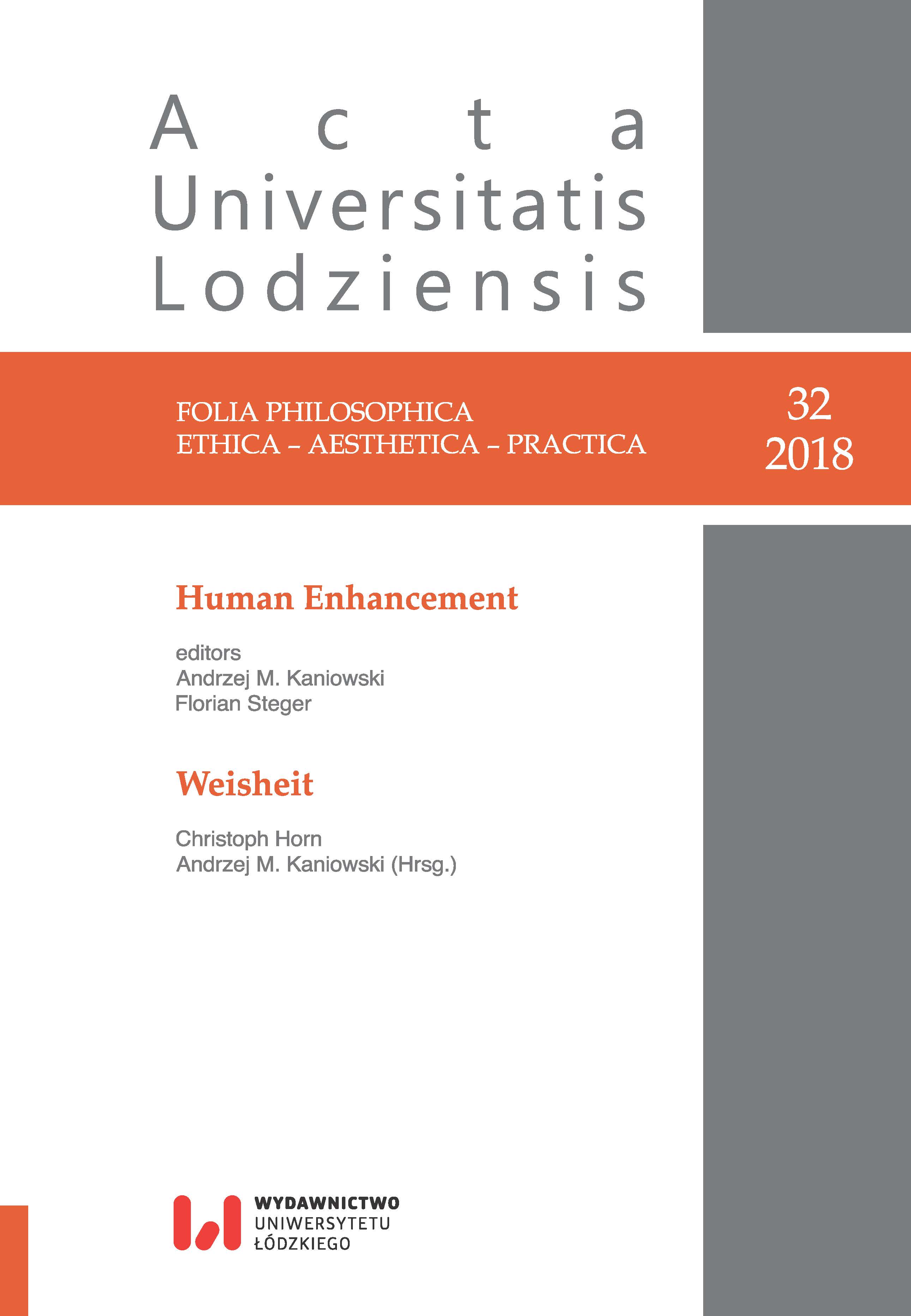Cognitive advice, testimonial authority and the value of epistemic wisdom
DOI:
https://doi.org/10.18778/0208-6107.32.13Keywords:
cognitive advice, epistemic authority, epistemic values, epistemic wisdom, metaepistemology, personal wisdom, value of wisdomAbstract
This paper deals with the question of which role wisdom plays in epistemology. Firstly, I briefly sketch the general framework of this inquiry. Linked to this is a specific proposal for the conceptual definition of epistemic wisdom. This proposal is explained in more detail with regard to three different aspects (ontological, epistemic, axiological) of the attribution of epistemic wisdom. In the following, the main thesis behind the proposed definition is discussed more closely. Accordingly, epistemic wisdom is a testimonial activity that has an interpersonal structure. As a consequence of this view, wise (cognitive) advisors are to be regarded as testimonial authorities whose cognitive superiority is to be analyzed within the framework of an “authority-resources model” of the explanation of personal wisdom. Finally, on the basis of this model, it can be shown that wisdom in connection with cognitive advice has a distinctive epistemic value.
References
Ardelt, Monika. „Wisdom as Expert Knowledge System: A Critical Review of a Contemporary Operationalization of an Ancient Concept.” Human Development 47, Nr. 5 (2004): 257–285.
Google Scholar
Baier, Annette. „Trust and Antitrust”. Ethics 96, Nr. 2 (1984): 231–260.
Google Scholar
Beahr, Jason. „Two Types of Wisdom”, Acta Analytica 27 (2012): 81–97.
Google Scholar
Beahr, Jason. „Sophia: Theoretical Wisdom and Contemporary Epistemology.” In Virtues and Their Vices, Hrsg. K. Timpe and C. Boyd, New York: Oxford University Press, 2014, 303–325.
Google Scholar
Faulkner, Paul. „On Telling and Trusting.” Mind 116 (2007): 875–902.
Google Scholar
Faulkner, Paul. Knowledge on Trust. New York: Oxford University Press, 2011.
Google Scholar
Fileva, Iskra und Tresan, Jon. „Wisdom Beyond Rationality: A Reply to Ryan.” Acta Analytica 28 (2013): 229–235.
Google Scholar
Fricker, Elisabeth. „Telling and Trusting: Reductionism and Anti-Reductionism in the Epistemology of Testimony.” Mind 104 (1995): 393–411.
Google Scholar
Frost-Arnold, Karen. „The cognitive attitude of rational trust.” Synthese 191 (2014): 1957–1974.
Google Scholar
Glück, Judith. Weisheit – Die 5 Prinzipien des gelingenden Lebens. München: Kösel-Verlag, 2016.
Google Scholar
Grimm, Stephen. „Wisdom.” Australasian Journal of Philosophy 93 (2015): 139–154.
Google Scholar
Hinchman, Edward. „Telling as Inviting to Trust.” Philosophy and Phenomenological Research 70 (2005): 562–587.
Google Scholar
Holton, Richard. „Deciding to trust, coming to believe”. Australasian Journal of Philosophy 72, Nr. 1 (1994): 63–76.
Google Scholar
Kyriacou, Christos. „Ought to Believe, Evidential Understanding and the Pursuit of Wisdom.” In Epistemic Reasons, Epistemic Norms, and Epistemic Goals, herausgegeben von Martin Grajner und Pedro Schmechtig, DeGruyter: Berlin & Boston, 2016, 383–406.
Google Scholar
McMyler, Benjamin. Testimony, Trust, & Authority. Oxford University Press, 2011.
Google Scholar
Miscevic, Nenad. „Wisdom, Understanding and Knowledge: A Virtue-Theoretic Proposal.” Acta Analytica 27 (2012): 127–144.
Google Scholar
Moran, Richard. „Getting Told and Being Believed.” Philosophers’ Imprint 5 (2005): 1–29.
Google Scholar
Raz, Joseph. The Morality of Freedom. Oxford: Clarendon Press, 1986.
Google Scholar
Raz, Joseph. The Authority of Law: Essays on Law and Morality. Oxford University Press, 2009.
Google Scholar
Reid, Thomas. An Inquiry into the Human Mind, Penn State University Press, 1997.
Google Scholar
Riggs, Wayne. „Understanding ‘virtue’ and the virtue of understanding.” In Intellectual virtue: perspectives from ethics and epistemology, herausgegeben von Michael DePaul and Linda Zagzebski, Oxford University Press, 2003, 203–226.
Google Scholar
Roberts Robert C. und Wood W. Jay. Intellectual Virtues: An Essay in Regulative Epistemology. Oxford University Press, 2007.
Google Scholar
Ryan, Shane. „Wisdom: Understanding and the Good Life.” Acta Analytica 31, Nr. 3 (2016): 235–251.
Google Scholar
Ryan, Sharon. „What is Wisdom?”. Philosophical Studies 93 (1999): 119–139.
Google Scholar
Ryan, Sharon. „Wisdom, Knowledge, and Rationality.” Acta Analytica 27 (2012): 99–112.
Google Scholar
Ryan, Sharon. „A Deeper Defense of the Deep Rationality Theory of Wisdom: A Reply to Fileva and Tresan.” Acta Analytica 32, Nr. 1 (2017): 115–123.
Google Scholar
Schmechtig, Pedro. „Ist Weisheit ein epistemisches Ziel?”. Zeitschrift für Philosophische Forschung 69, Nr. 4 (2015): 529–549.
Google Scholar
Schmechtig, Pedro. „Epistemische Werte.” In Handbuch Erkenntnistheorie, herausgegeben von M. Grajner & G. Melchior, Stuttgart: Metzler, im Druck 2019, 286–294.
Google Scholar
Shogenji, Tomoji. „A Defense of Reductionism about Testimonial Justification of Beliefs.” Nous 40 (2006): 331–346.
Google Scholar
Swartwood, Jason D. „Wisdom as an Expert Skill.” Ethical Theory and Moral Practice 16, Nr. 3 (2013): 511–528.
Google Scholar
Tiberius, Valerie. The Reflective Life – Living Wisely within our Limits. Oxford University Press, 2008.
Google Scholar
Whitcomb, Denis. „Wisdom.” In Routledge companion to epistemology, herausgegeben von S. Bernecker and D. Pritchard, London: Routledge, 2010, 95–105.
Google Scholar
Zagzebski, Linda. Virtues of the mind. Cambridge University Press, 1986.
Google Scholar
Zagzebski, Linda. Epistemic Authority – A Theory of Trust, Authority, and Autonomy in Belief. Oxford University Press, 2012.
Google Scholar
Downloads
Published
How to Cite
Issue
Section
License

This work is licensed under a Creative Commons Attribution-NonCommercial-NoDerivatives 4.0 International License.












